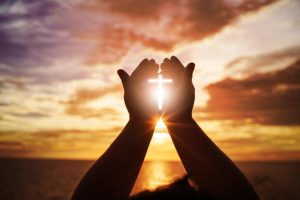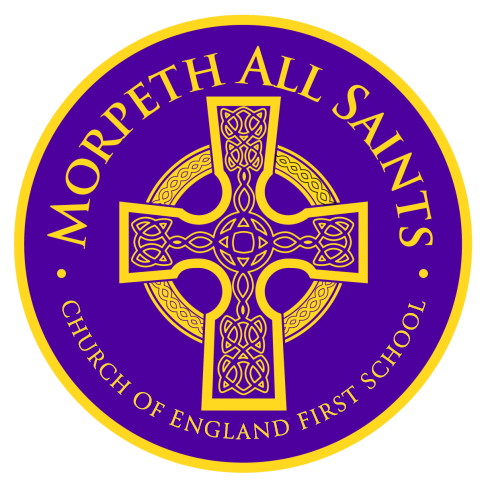Religious Education here at Morpeth All Saints…

Religious Education is embedded in our vision, ethos and values which are at the heart of what we aim to do in every aspect of school life. The importance placed on the development of the whole child spiritually, morally, socially, culturally and intellectually is reflected in our RE curriculum. As a Church of England Aided school, we use the Durham and Newcastle Diocesan RE Syllabus from Reception to Year 4 and teach Christianity as a majority study alongside a range of world religions and worldviews.
We employ a variety of teaching methods through discussion, recording, active participation, outside visitors, trips, art, music, the development of thinking skills, drama, the use of artefacts, pictures, stories, and the use of periods of stillness and reflection. Where possible, we want our pupils to have opportunities to encounter local faith communities through visits to local places of worship or visits from members of local faith communities.
In addition, children take part in a daily act of collective worship. Our school ethos of Together we learn with Love and Laughter and our list of aims outline the importance of recognising the place of God in our world and in our lives. We seek always to reflect in our worship, the Christian foundation of the school and its care for all who work there. Children are helped to understand the purpose of Christian Worship, share in it and appreciate the value of it.
Intent:
At Morpeth All Saints, we are committed to giving our children the best possible start in life and enabling them to truly flourish as global citizens. This involves them becoming confident independent thinkers, who have a breadth of knowledge about the world in all its diversity, and are able to hold balanced, respectful and informed conversations about religion and belief. Our school welcomes those of all faiths and none, while having its foundation in Christian values and it is linked to our local Christian worshipping communities. Day-to-day life reflects that Christian foundation throughout the whole curriculum and within the ethos of the school. Every pupil has an entitlement to Religious Education at MAS. RE is an important element of a broad and balanced education and along with other subjects forms the core curriculum. Religious Education at Morpeth All Saints aims to:
- provide for all pupils to learn and achieve
- promote the spiritual, moral, social and cultural development of pupils and prepare them for the opportunities, responsibilities and experiences of life.
- provide an inclusive and broad understanding of world religions and nonreligious worldviews.
We aim to develop children’s religious literacy as well as provide opportunity for children to reflect personally on the big questions of life. Our broad RE curriculum aims to include a balance of theology, philosophy and social and human sciences or in other words, includes a balance of learning about believing, thinking and living, in relation to the religious and non-religious worldviews studied. At Morpeth All Saints we celebrate the wonderful diversity of thought, belief and practice that may be found within our school community and aim to expand children’s understanding of the even greater diversity of thought, belief and practice found across the globe and to help them engage with this diversity in a positive, inquisitive and respectful way.
Implementation:
As a Voluntary Aided Church of England School, children get an entitlement of 36 hours in Key Stage 1 and 45 hours in Key Stage 2. This is outworked at Morpeth All Saints as a weekly Religious Education lesson throughout our school based on ‘The Durham and Newcastle Diocesan Syllabus’, as well as additional study of different religions and beliefs as part of Interfaith Week in the Autumn term. As part of the Durham and Newcastle Diocesan syllabus, the resource Understanding Christianity is used for the Christian teaching elements at all Key stages and follows the pattern of learning about beliefs, understanding the impact in the lives of believers and making connections to other worldviews or their own lives. Although RE is non- statutory in EYFS, we know the value of giving children the foundational building blocks for their ongoing learning at an early stage and so the study of religious festivals from different religions happens linked to the calendar and key concepts of Christianity are taught using the EYFS Understanding Christianity Resource. As a one and a half form entry children receive progressive teaching throughout their time at Morpeth All Saints on a rolling 2 year program, with skills that progressively build year on year. In Key Stage 1, where RE is taught for 36 hours (1 hour per week). Christianity is approximately two thirds of their study time and the remainder is Islam and Judaism. In Key Stage 2, the entitlement is 45 hours (1.15 hours per week). Across the whole of KS2, pupils study Christianity for approximately two thirds of study time, plus, Hinduism, Sikhism and Buddhism. Our teaching of RE is full of discussion and answering key questions. Children dig deeper to make sense of religious texts, make connections with their life and understand the greater impact within the community and in the world. Parents do have every right to withdraw their children from Religious Education. However, parents are encouraged to discuss the matter with the Headteacher before a final decision on withdrawal is made. Parents should be left in no doubt that RE, in this school, is concerned with the development of the whole child as a person with proper respect for individual freedom.
Impact:
At Morpeth All Saints we assess the impact of our Religious Education curriculum in many different ways. This begins with the use of formative assessment within lessons and targeted feedback at the point of learning, which is not solely the end product on paper but through the way children communicate about their understanding of RE. Although distinct from our Religious Education curriculum, collective worship provides another opportunity to assess the impact of our curriculum through observing the way children apply their knowledge in class collective worship discussions and in how they demonstrate respectful engagement with beliefs that may differ to their own. Outcomes produced by the children are assessed against the desired skills and knowledge relevant to the specific year groups. At the end of each term, judgements are made against end of year expectations, which inform next steps for cohorts. Ongoing assessment of children’s enjoyment and appreciation of their RE learning occurs through formal and informal pupil voice feedback.

